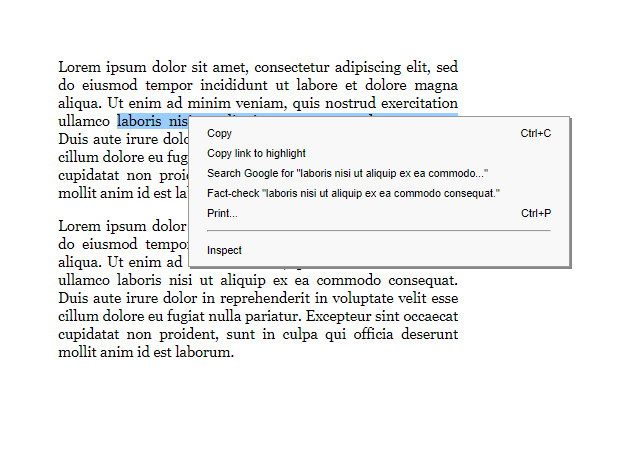Wikifact
| Wikifact | |
|---|---|
| Status of the proposal | |
| Status | under discussion |
| Details of the proposal | |
| Project description | Wikifact is a resource for real-time collaborative fact-checking. |
| Is it a multilingual wiki? | To be determined. |
| Potential number of languages | Multiple languages. |
| Proposed tagline | A resource for real-time collaborative fact-checking. |
| Technical requirements | |
| New features to require | To be determined. |
Introduction
This is a proposal for Wikifact, a resource for real-time collaborative fact-checking.
Wikifact would be a statement-centric resource where individual statements would have articles about them.
As envisioned, soon, people will be able to fact-check arbitrary portions of documents in word processors and Web browsers simply by selecting content, using context menus, and making use of crowdsourced, collaborative resources such as Wikifact. People will be able to select content from social media websites, news articles, digital textbooks, or any other documents and websites, and then open context menus providing options for exploring, e.g., fact-checking, the selected content.
Use cases and scenarios for the proposed project include: journalism, fact-checking, rational skepticism, critical thinking, education, science, science communication, and the public interest.
How to support or oppose this proposal
To support or oppose this proposal, you must be logged in to meta.wikimedia.org.
Next, to support this proposal, simply scroll down to the bottom and click to edit the People interested wiki section, adding your signature on a new line by typing a pound sign and four tildes: # ~~~~ and publishing the edited page section.
Next, to oppose this proposal, simply scroll down to the bottom and click to edit the People opposed wiki section, adding your signature on a new line by typing a pound sign and four tildes: # ~~~~ and publishing the edited page section.
That's all there is to it. Thank you for adding your signature to the proposal!
How to join as a co-proposer of this proposal
Please contact Adam Sobieski for more information about how to become a co-proposer of this project proposal.
Proposed by
- AdamSobieski (talk)
- Teemu (talk)
Alternative names
- Wikifacts
- Wikicheck
- Wikifactcheck
- Wikifactchecking
- Wikistatements
- Wikimeta
Related projects / proposals
- AFCNR (pdf)
- BRENDA (pdf)
- ClaimPortal (pdf) (link)
- Full Fact's System (html)
- Sphere (pdf) (source)
- Squash (html)
- W3C Credible Web Community Group (website)
- Fake news debunker by InVID & WeVerify (website)
- WikiCheck
Mailing list links
- https://lists.wikimedia.org/hyperkitty/list/wikimedia-l@lists.wikimedia.org/thread/BWGOZYLLAY3RQHZTUVLAZWVH2UWRLZHD/
- https://lists.wikimedia.org/hyperkitty/list/wikimedia-l@lists.wikimedia.org/message/OJWMPGVIB653SQKOSDFNW4DVHIVFLJRM/
- https://lists.wikimedia.org/hyperkitty/list/wikidata@lists.wikimedia.org/message/SAGDXXRPCDAUYFG5PZYC7CBO5KVFDIXF/
Demos
None.
Technical discussion
Frontend: Content selection and context menus
As envisioned, end-users could simply select document content and utilize context menus to access, in new tabs, relevant proofs, arguments, justifications, or fact-checking information.
For Web browsers and word processors, in general, these features would presently require plug-ins or extensions. After installing a plug-in or extension, end-users would be able to fact-check selections of content.
For individual websites where fact-checking capabilities were desired for end-users, e.g., Wikinews, Wikipedia, or Wikisource, JavaScript could provide customized context menus for selections of content.
Backend: Wikidata
With ontologies and schemas which define the properties of and relationships between statements, Wikifact could utilize Wikidata as a backend.
More technical discussion
More technical discussion is available here.
Slideshows and presentations
Use cases and scenarios
Use cases and scenarios for Wikifact include, but are not limited to: journalism, fact-checking, rational skepticism, critical thinking, education, science, science communication, and the public interest.
With respect to public-interest-related use cases and scenarios, end users could perform real-time fact-checking as they author and review arbitrary documents in word processors and Web browsers.
These arbitrary documents would include social media websites and Wikifact could empower end-users to mitigate misinformation and disinformation.
These arbitrary documents would include political speeches and Wikifact could ensure and enhance government transparency and accountability.
These arbitrary documents would include Wikinews, Wikipedia, and Wikisource articles and Wikifact could enhance the collaborative processes of creating and editing wiki resources.
People interested
 Support. --DougClark55 (talk) 17:50, 18 February 2021 (UTC)
Support. --DougClark55 (talk) 17:50, 18 February 2021 (UTC) Support:Much neededVis M (talk) 12:12, 25 February 2021 (UTC)
Support:Much neededVis M (talk) 12:12, 25 February 2021 (UTC) Support. It will be interesting to have the project as a structured edition of Wikinews, similarly as Structured Commons Project. --Csisc (talk) 13:57, 22 March 2021 (UTC)
Support. It will be interesting to have the project as a structured edition of Wikinews, similarly as Structured Commons Project. --Csisc (talk) 13:57, 22 March 2021 (UTC) Support Benjamg (talk) 10:05, 18 July 2022 (UTC)
Support Benjamg (talk) 10:05, 18 July 2022 (UTC) Support: Bob Wyman (talk) 15:26, 18 July 2022 (UTC)
Support: Bob Wyman (talk) 15:26, 18 July 2022 (UTC) Support Slaroque (talk) 21:11, 22 July 2022 (UTC)
Support Slaroque (talk) 21:11, 22 July 2022 (UTC)
People opposed
-
 Oppose - Hérisson grognon 13:59, 14 May 2021 (UTC)
Oppose - Hérisson grognon 13:59, 14 May 2021 (UTC) -
 Oppose - Animalparty no timestamp - just seems likely to invite more random anonymous Wikimedians cosplaying as journalists and self-appointed arbiters of truth. What's next, Wiki New York Times? Wiki National Geographic? Wikitruth?
Oppose - Animalparty no timestamp - just seems likely to invite more random anonymous Wikimedians cosplaying as journalists and self-appointed arbiters of truth. What's next, Wiki New York Times? Wiki National Geographic? Wikitruth?

